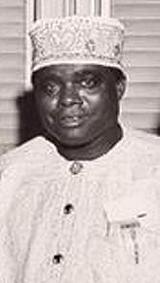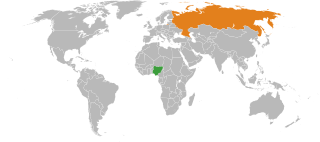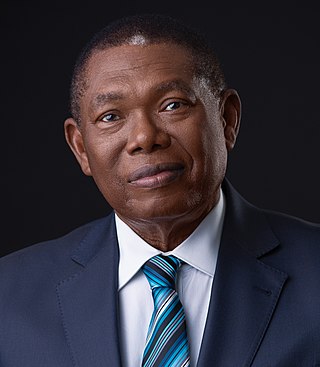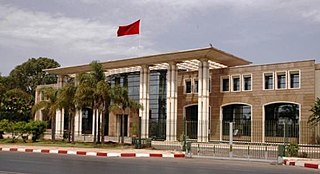
Since independence, with Jaja Wachuku as the first Minister for Foreign Affairs and Commonwealth Relations, later called External Affairs, Nigerian foreign policy has been characterised by a focus on Africa as a regional power and by attachment to several fundamental principles: African unity and independence; capability to exercise hegemonic influence in the region: peaceful settlement of disputes; non-alignment and non-intentional interference in the internal affairs of other nations; and regional economic cooperation and development. In carrying out these principles, Nigeria participates in the African Union, the Economic Community of West African States (ECOWAS), the Non-Aligned Movement, the Commonwealth of Nations, and the United Nations.

Sir Abubakar Tafawa Balewa was a Nigerian politician who served as the first and only prime minister of Nigeria upon independence. A conservative Anglophile, he favoured maintaining close ties with the British. During his first few years in office as prime minister, Nigeria was a constitutional monarchy with Elizabeth II reigning as Queen of Nigeria, until Nigeria became a republic in 1963. He was both a defender of Northern special interests and an advocate of Nigerian reform and unity.

Jaja Anucha Ndubuisi Wachuku was a Pan-Africanist and a Nigerian statesman, lawyer, politician, diplomat and humanitarian. He was the first Speaker of the Nigerian House of Representatives; as well as the first Nigerian Ambassador and Permanent Representative to the United Nations. Also, Wachuku was the first Nigerian Minister for Foreign Affairs. Notably, Wachuku was a Royal Prince of Ngwaland, "descendant of 20 generations of African chiefs in the Igbo country of Eastern Nigeria".
Josaiah Ndubuisi Wachuku was king, paramount chief, servant leader and Eze of Ngwa-land – in the then Aba Division of Eastern Nigeria – during British colonial times.
Ike Omar Sanda Nwachukwumni ; born 1 September 1940) is a retired Nigerian Army major general and politician who served twice as Foreign Minister of Nigeria during the military regime of General Ibrahim Babangida, and as a Senator for Abia North from 1999 to 2003.

The First Republic was the republican government of Nigeria between 1963 and 1966 governed by the first republican constitution. The country's government was based on a federal form of the Westminster system. The period between 1 October 1960, when the country gained its independence and 15 January 1966, when the first military coup d’état took place, is also generally referred to as the First Republic. The first Republic of Nigeria was ruled by different leaders representing their regions as premiers in a federation during this period. Leaders include Ahmadu Bello Northern Nigeria 1959–1966, Obafemi Awolowo Western Nigeria 1959–1960, Samuel Akintola Western Nigeria 1960–1966, Michael Okpara Eastern Nigeria 1960–1966, and Dennis Osadebay Mid-Western Nigeria 1964–1966.

Brazil–Nigeria relations are the current and historical relations between the Federative Republic of Brazil and the Federal Republic of Nigeria. Brazil and Nigeria maintain a traditional and diversified relationship, with a strong Nigerian influence on Brazilian cultural and social formation. Both nations are members of the Group of 77 and the United Nations.

Nigeria–Russia relations are the bilateral foreign relations between Nigeria and Russia. Russia has an embassy in Lagos and a representative office in Abuja, and Nigeria has an embassy in Moscow.
Isiala-Ngwa North is a Local Government Area of Abia State, Nigeria. Its headquarter is in the town of Okpuala-Ngwa.
The Ministry of Foreign Affairs and International Cooperation is the foreign policy department of the Government of Sierra Leone.

Nwabueze Jaja Wachuku Nwokolo, a royal princess of Ngwaland, is a Nigerian United Kingdom based lawyer who is council member at Law Society of England and Wales; including being a director and board chair of Great Britain's BSN: Black Solicitors Network, the largest membership organisation of its kind in Europe. Nwokolo is a member of Law Society of England and Wales' Minority Ethnic Concerns Group. Also, she sits on the RAB: Regulatory Affairs Board of the Law Society.

Chuku Wachuku, a royal prince of Ngwaland, is a United States educated Nigerian economist, politician, statesman, servant leader, business analyst, management expert and specialist on entrepreneurship development and SMEs: Small and Medium Enterprises. He is first Director-General of Ngwa origin at Federal Government of Nigeria major parastatal; NDE: National Directorate of Employment.

Geoffrey Jideofor Kwusike Onyeama is a Nigerian diplomat and politician who served as the minister for foreign affairs of Nigeria from November 2015 to May 2023. He was appointed foreign affairs minister in November 2015 by President Muhammadu Buhari.
Aminu Bashir Wali was Nigeria's Minister of Foreign Affairs from 2014 to 2015.

Yusuf Maitama Tuggar is a Nigerian diplomat and politician who is the current Nigerian minister of foreign affairs. He served as the Nigerian Ambassador to Germany from 2017 to 2023. He was previously a member of the Nigerian House of Representatives from 2007 to 2011 representing Gamawa; and he ran twice for the office of the governor of Bauchi State.












